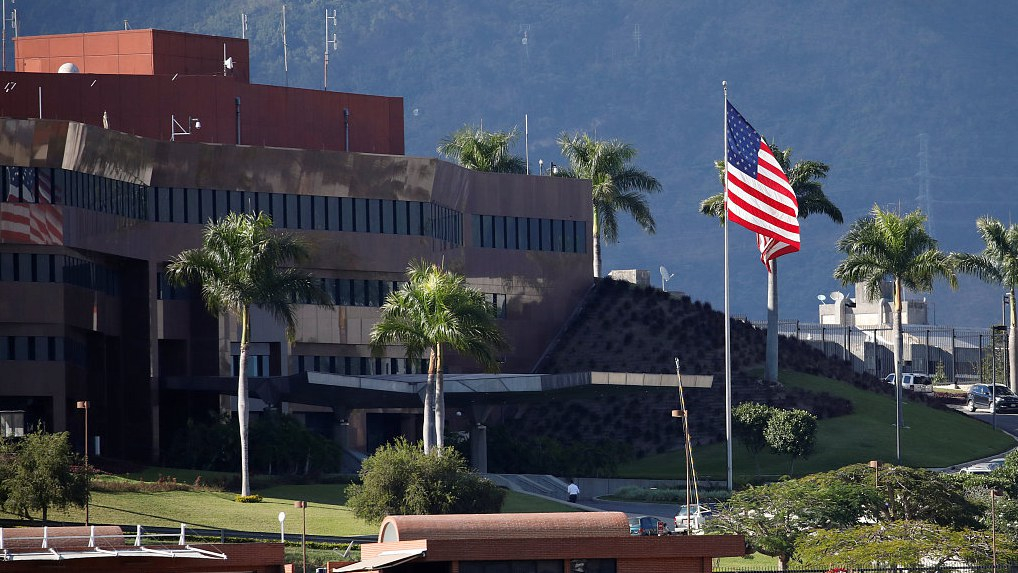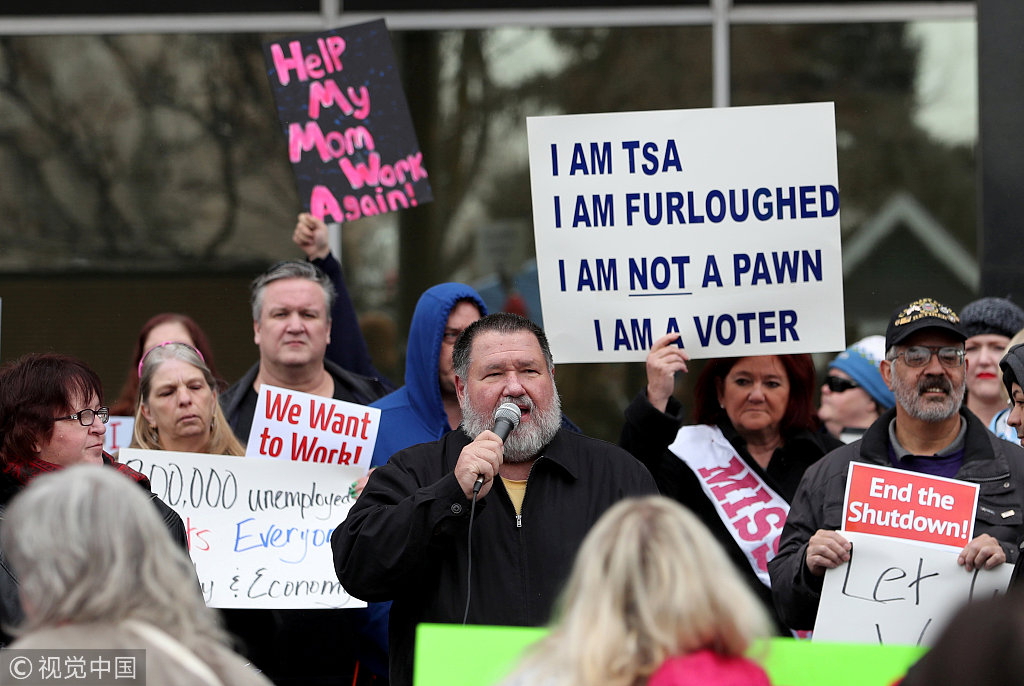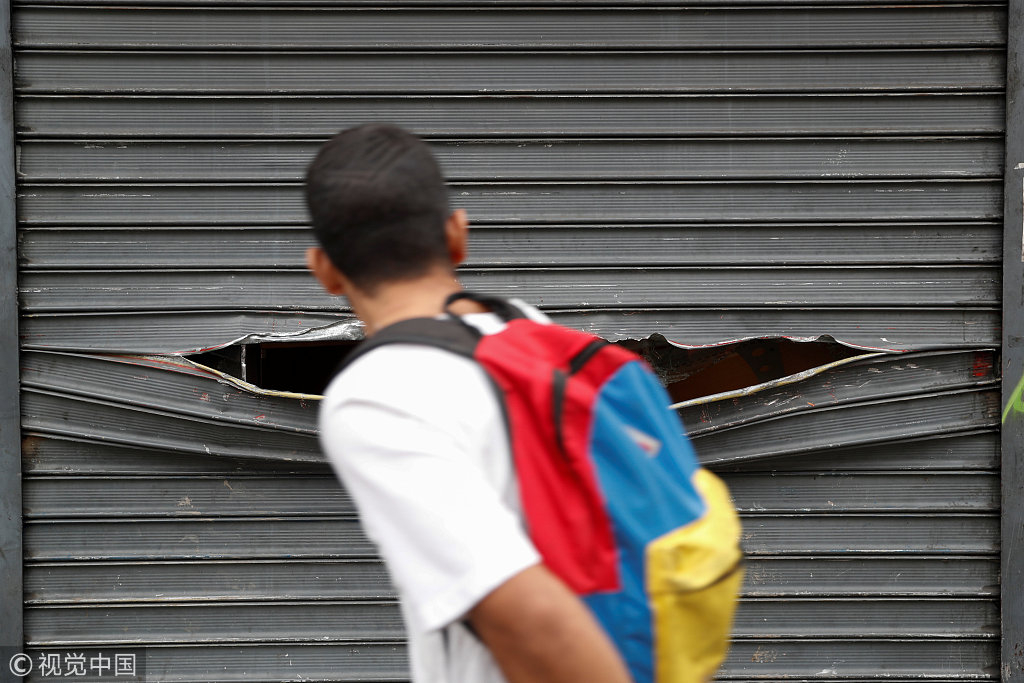
Opinion
12:24, 25-Jan-2019
Opinion: Is Venezuela being used as Trump's political theatre?
Tom Fowdy

Editor's note: Tom Fowdy, who graduated with an MSc in Chinese Studies from Oxford University having previously majored in politics at Durham University, writes on the international relations of China and the Democratic People's Republic of Korea. The article reflects the author's views, and not necessarily those of CGTN.
Domestic politics in the United States is starting to turn up the heat on U.S. President Donald Trump. A governmental shutdown which is now in its 35th day is the longest in the country's history; it shows no clear sign of ending. The majority of voters in polls blame the president. Last night, six Republican senators crossed party lines to vote for a Democrat-sponsored bill aimed at re-opening the government without Trump's wall. The bill failed, but the shift hinted that Republican unity and solidarity behind the administration's ransom tactics is starting to wane.
Recognizing this growing isolation and weakening of his position, Trump has pulled another trick from his playbook. That is to create a distraction, one capable of diverting all media attention from domestic political woes and focus on something entirely different. What is the distraction? To jump head first into a crisis in Venezuela and escalate it further. Looking at the media coverage, it's worked a treat. Talk of 800,000 federal workers without pay, attrition damage to U.S economic growth and Trump taking the heat aren't leading international news headlines anymore, his bid to topple a government in Latin America is instead.

Internal Revenue Services (IRS) employee Matt Westrich speaks in front of the Federal building at a rally against the ongoing U.S. federal government shutdown, in Ogden, Utah, U.S., January 10, 2019. /VCG Photo
Internal Revenue Services (IRS) employee Matt Westrich speaks in front of the Federal building at a rally against the ongoing U.S. federal government shutdown, in Ogden, Utah, U.S., January 10, 2019. /VCG Photo
All politicians are tactful in creating distractions to steer publicity away from negative and politically painful coverage, it is an age-old tactic. Trump, however, is exceptionally good at it, perhaps more than any other leader in modern history. Perhaps a legacy of his life in show business, few others are able to manipulate the flow of media to their own design.
If he wants to create a distraction from something he doesn't like, he simply does or says something outrageous or completely bizarre and the media runs after it. It's what allowed him to achieve maximum coverage, outflank all of his election opponents and he has very much carried that trait into office. There is no doubt that he has turned the presidency into a reality TV show.
For the first two years, Trump received an easy ride. Congress was on his side and the economy was doing well. The Russia/Mueller probe was the only serious political liability he faced. His opposition disliked him and they had, of course, an ever-growing list of things to dislike and criticize, but they were not able to swing serious blows against him. However, fast forwards to 2019 and things are different.
Now that the Democrats control the House of Representatives, the real political warfare against his administration has begun. Very quickly on the issue of his wall, Trump has found the opposition has gained the upper hand. So far, his attempts to set the narrative by scaremongering about crime and drugs have fell flat. As the government shutdown lingers on and he suffers the embarrassment of delaying the State of the Union Address, he needs a distraction, and fast.
Thus comes Venezuela. It's a long term crisis, one escalating out of extreme economic mismanagement, but when could there be a better time to jump in head first? Indeed, a government change in that country has been on the cards since Trump took office, but in the view of the domestic heat turning up on him, now is the most politically astute time for a head-on foreign policy confrontation against a stereotypical “villain”.

A man walks past the damaged gate of a liquor store after it was looted in Caracas, Venezuela, January 24, 2019. /VCG Photo
A man walks past the damaged gate of a liquor store after it was looted in Caracas, Venezuela, January 24, 2019. /VCG Photo
And who else is left? America is negotiating with China and the DPRK so they are off the list, he's already vowed to withdraw U.S. troops from Syria too, so that leaves the impoverished Latin American nation as the only feasible target left.
And voila! Trump tweets that he recognizes the opposition as the official government and before you know it, global media are giving the crisis blanket coverage. But he isn't finished yet. The Trump administration is now preparing brutal unilateral sanctions against the regime, Pompeo has called a United Nations Security Council meeting too, and the threat of military action is being hinted at. Although the UNSC meeting will obviously not produce any results, as China and Russia will veto the resolution, it is nevertheless operated as a political and media theater. It works, we simply aren't focusing on the shutdown anymore, all eyes are diverted elsewhere.
Given this, we should expect Trump to continue to escalate the Venezuela crisis. With America maintaining resolute hegemony in Latin America, stakes are low and he has absolutely nothing to lose by pushing all the way to military intervention, this isn't like the DPRK situation where he needs a face-saving excuse to back down. If the government shutdown ends in a way which leaves him humiliated over his wall, then expect him to become more aggressive. Yes, there are always wider foreign policy objectives behind these decisions, but for Trump, this is very much his television show, and we are very much the audience.
(Top image: A U.S. flag waves at the U.S. Embassy in Caracas, Venezuela, January 24, 2019. /VCG Photo)
(If want to contribute and have specific expertise, please contact us at opinions@cgtn.com)

SITEMAP
Copyright © 2018 CGTN. Beijing ICP prepared NO.16065310-3
Copyright © 2018 CGTN. Beijing ICP prepared NO.16065310-3